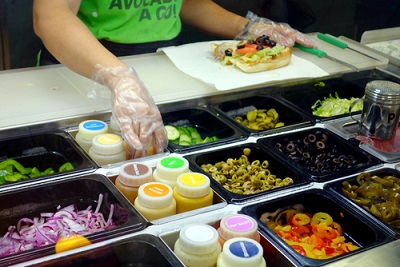
 via Shutterstock)” width=”400″ height=”267″ />A Subway fast food restaurant on September 5, 2013 in Toronto. Subway is the world’s largest single restaurant chain with 38,181 restaurants. (Photo via Shutterstock)As if fast food weren’t bad enough, there’s the plight of fast food workers. Low wages and bad working conditions have brought people to the street in protest around the nation, with workers demanding better wages. And while McDonald’s is often the one to get a lot of flack – after all, it was the company that launched an internal website with tips for employees that included breaking “food into pieces” which would give the illusion of more to eat — there’s another chain in town that’s currently in the standings for Worst Employee Treatment: Subway.
via Shutterstock)” width=”400″ height=”267″ />A Subway fast food restaurant on September 5, 2013 in Toronto. Subway is the world’s largest single restaurant chain with 38,181 restaurants. (Photo via Shutterstock)As if fast food weren’t bad enough, there’s the plight of fast food workers. Low wages and bad working conditions have brought people to the street in protest around the nation, with workers demanding better wages. And while McDonald’s is often the one to get a lot of flack – after all, it was the company that launched an internal website with tips for employees that included breaking “food into pieces” which would give the illusion of more to eat — there’s another chain in town that’s currently in the standings for Worst Employee Treatment: Subway.
After doing an analysis of data from the Department of Labor’s Wage and Hour Division, CNN Money found Subway franchisees in violation of pay and hour rules in more than 1,100 investigations. Because each investigation can actually have multiple violations, there were more than 17,000 Fair Labor Standards Act violations found, resulted in $3.8 million of reimbursement to Subway workers.
What kind of violations are happening?
Not paying employees for time worked past their scheduled shifts, making “illegal deductions from employees’ wages when there were cash register shortages, causing their pay to fall below the federal minimum wage,” and “asking workers to sign contracts waiving time-and-a-half pay.”
Things are so bad that the Department of Labor has offered to partner with Subway to help them comply.
“It’s no coincidence that we approached Subway because we saw a significant number of violations,” a Department of Labor spokesperson told CNN Money.
Subway operates under a franchise model, which actually can help to reduce their accountability in situations like these. From CNN Money:
The fast food franchise model provides a layer of protection for Subway, McDonald’s and Dunkin’ Donuts. Even though fast food locations may look the same and restaurants abide by similar branding and business guidelines, each franchise owner is treated essentially as a small business. Meanwhile, the corporate parents can distance themselves from being found liable of labor violations.
Those corporations are doing quite well financially. While Subway workers are making around $7.25 an hour, CEOs are certainly pulling in much more. Public policy and advocacy group Demos found that “in 2012, the compensation of fast food CEOs was more than 1,200 times the earnings of the average fast food worker. Proxy disclosures recently released by fast food companies reveal that the ratio remained above 1,000-to-1 in 2013.”
That’s a pretty big discrepancy. And there’s even a discrepancy vis-a-vis other industries. “The average CEO at fast food companies earned $23.8 million in 2013, more than quadruple the average from 2000 in real terms,” says Demos.
Numbers make the violations like Subway and their counterparts even more disturbing, especially when you look at recent reports that show that those executives are also benefitting from tax subsidies.
Subway might be the fast food chain with the most violations, but the fast food industry needs to be held accountable as a whole.
Our most important fundraising appeal of the year
December is the most critical time of year for Truthout, because our nonprofit news is funded almost entirely by individual donations from readers like you. So before you navigate away, we ask that you take just a second to support Truthout with a tax-deductible donation.
This year is a little different. We are up against a far-reaching, wide-scale attack on press freedom coming from the Trump administration. 2025 was a year of frightening censorship, news industry corporate consolidation, and worsening financial conditions for progressive nonprofits across the board.
We can only resist Trump’s agenda by cultivating a strong base of support. The right-wing mediasphere is funded comfortably by billionaire owners and venture capitalist philanthropists. At Truthout, we have you.
We’ve set an ambitious target for our year-end campaign — a goal of $125,000 to keep up our fight against authoritarianism in 2026. Please take a meaningful action in this fight: make a one-time or monthly donation to Truthout before December 31. If you have the means, please dig deep.